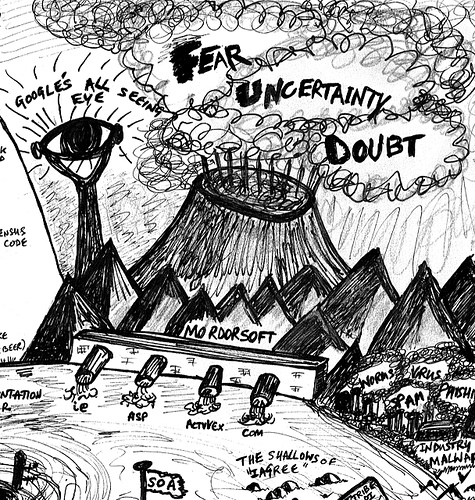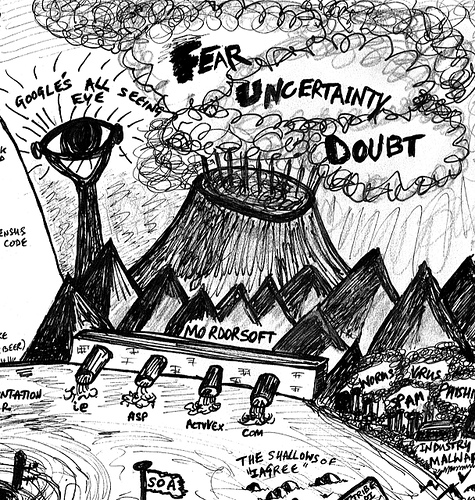 Don’t FUD it upImage: psdFDR must have been talking about the Internet when he famously said that we have nothing to fear but fear itself. Everywhere you turn there is another study raising some new hazard and questioning some baseline assumption about how our society lives, eats or fuels itself. And then in short order, another study appears questioning the conclusions of the first — leaving us all full of nothing but FUD.
Don’t FUD it upImage: psdFDR must have been talking about the Internet when he famously said that we have nothing to fear but fear itself. Everywhere you turn there is another study raising some new hazard and questioning some baseline assumption about how our society lives, eats or fuels itself. And then in short order, another study appears questioning the conclusions of the first — leaving us all full of nothing but FUD.
FUD, of course, stands for the bedrock principles of a depressingly large segment of corporations (and politicians) — Fear, Uncertainty, Doubt. The concept may go back as far as the 1920s, but it was Microsoft (inspired by IBM) that institutionalized it as a corporate practice. FUD was (and to some extent is) a strategy designed to maintain Microsoft’s hold over its customers. “Sure,” Microsoft sales reps would say, “You could switch to [Apple/Linux/Lotus Notes] but here’s what will happen…” They would then shower wavering customers with horror stories about the competitor’s reliability, compatibility, even viability as a company. It was, as we know, very effective.
What does this have to do with food and the environment? Well, in my opinion, what I like to call the FUD-osphere is now the greatest threat to any hope of victory in the fights against climate change, for public health and against unsustainable agriculture. The FUD-osphere — that swirl of Fear, Uncertainty and Doubt that now permeates all media — is made up of entities like the secretive product defense firms that companies hire to produce studies debunking negative health claims regarding their products. Fast Company did a fantastic profile of this network of Sith-lord scientists and unrepentant PR flacks who have no compunctions about tweaking their research methodologies (in this case over bisphenol-A) to generate results both favorable to industry and confusing to those trying to understand the truth. It’s the product defense firms that allow the food industry to claim there isn’t mercury in HFCS or that phlatates or VOCs or any other industrial chemical that might get some bad press aren’t really harmful.
The FUD-osphere includes doctors who perform industry-funded research to demonstrate the safety of new drugs (Vioxx, anyone?). It includes crackpot scientists and historians, like James McWilliams, who has an op-ed in the NYT in defense of factory-farmed pork — shown to be fiction by Marion Nestle and and Civil Eats. McWilliams has a history with this kind of thing — he authored a deeply flawed article in Slate — debunked here — accusing organic agriculture of responsibility for the presence of heavy metals in soil. Meanwhile, he has written a forthcoming book about the evils and dangers of local food. Really.
And the FUD-osphere certainly includes the entire global warming denier movement. Without the FUD-osphere relentlessly spewing pseudo-science and flawed resesarch, we wouldn’t need Dave Roberts to categorize and debunk an exhaustive list of Climate Myths. It’s useful to have that kind of thing handy when you see a leader of the denier movement, Marc Morano, profiled in the NYT. In fact, to read the article is to understand how many journalists are the FUD-osphere’s true, and pernicious, partners in crime. Driven by a desire for conflict — often in the form of “he said/she said” stenography — and the contrary view, the mainstream media embraces the FUD-osphere as a crucial element to any good story.
Making matters worse, the media has adopted a twisted definition of journalistic objectivity. A journalist in a paper of record or in a national magazine will almost never directly rebut or debunk even outright lies. They will merely record the other side’s objection, leaving the conclusions to be drawn by the reader. The Fox News tagline of “We Report, You Decide” perfectly encapsulates this approach. In the case of Morano, nowhere in the article is any claim he has made directly addressed. It’s left to “environmental advocates and bloggers” to provide a critique, which gives the reader not objective facts, but two sides of a coin.
Meanwhile, politicians — Republicans in particular — are masters of this game. Only those well-versed in the techniques of FUD could pull off a maneuver like successfully promulgating the claim that Obama is cutting overall defense spending when he’s really raising it. You could almost say that at this point the GOP is the Party of FUD — how else to interpret the Bush administration’s famous assertion that they can “make their own reality.” Or the fact that the Bush-era EPA, the FDA — even NASA — were populated with FUD-ocrats extraordinare.
Even the good guys can enter the FUD-osphere. The scare emails surrounding H.R. 875, one of the food safety bill before Congress, is a perfect example. No matter how many times the erroneous claims that this bill will “destroy farmers markets” or “end organic agriculture” are debunked, the emails, often from groups that support local, organic food, keep coming.
In the FUD-osphere, as in Newtonian physics, every action as an equal and opposite reaction. In physics that phenomenon demonstrates the power of inertia. In society, it’s the power of the status quo. In an environment where every time you yell “Yes,” someone else yells “No” even louder, it’s awfully hard to make any headway, rhetorical or otherwise. Raising the decibel level by yelling louder clearly isn’t the answer. Unfortunately, I don’t know what is.



